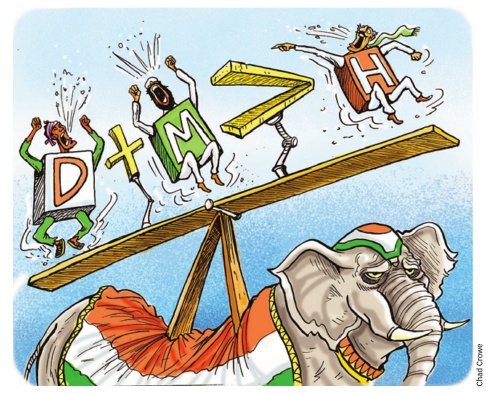
Then came a report on the growing compensation gap in Indian companies, and it set off the usual outrage over `vulgar CEO salaries’. TV channels went berserk over the lifestyle of Vijay Mallya, a big debtor to our perilous banks. And far away in America, Hillary Clinton’s campaign for the presidency is in trouble partially because of the rhetoric of inequality .
Our desire for equality is a natural human impulse, but we ought to resist the temptation to react in a knee-jerk manner. At India’s stage of development, we should focus on creating opportunities and reducing extreme poverty and not obsess over inequality .
I have always believed that it is none of my business how much the Ambanis earn as long as they create lots of jobs, pay their taxes and produce wealth for society . The aam admi cares mostly about how he is faring; he sometimes compares himself to his friends but never to the filthy rich.
Judging the lifestyle of others tempts one to want to control other things, and this is a short step to becoming a command society . Not to live ostentatiously is a call of dharma, not a legal duty .
India elected Narendra Modi in 2014 because he changed the rhetoric of the country from inequality to opportunity .Sick and tired of the politics of give-aways, the Indian voter was charmed by Modi’s fresh appeal to the aspirational impulse within us. He promised real jobs rather than bogus, NREGA `make-work jobs’.
Unfortunately , the economy remains in the doldrums and he has not delivered on this promise. And so, the approaching budget should pre-eminently address job creation and this is how we should evaluate it.
The government can create jobs by investing in infrastructure, and the big question is whether finance minister Arun Jaitley should invest massively in infrastructure at the expense of breaking his promise to meet a fiscal deficit target. Since India has recently lost its reputation for reliability, i would vote for keeping his promise.
Instead, he should raise funds for infrastructure by an equally massive sale of shares held by the government in private companies (SUUTI) and its own public sector companies. The shockingly unhealthy public sector banks should be the first candidates for disinvestment.
Opportunity also comes from having a good start in life. If absolute equality is an unrealistic goal the human ego will not shrink that far equality of opportunity is achievable through education and health care.
Clearly, India needs to invest more in health and pay greater attention to improving the quality of student outcomes in education. The state does not have to run schools and hospitals but it needs to provide for them. We should assess the coming budget on this criterion as well.
Many of us are revolted by the vast differences in life prospects of our citizens. We are even uneasy about nature’s unfairness why should a handsomer face earn more in the job and marriage markets rather than a person who works hard or contributes more to society? We are offended by the hierarchical mind-set at the workplace: `What is right is what the boss wants.’ Or in politics: `Touch my feet, my son, and I will protect you.’ Rohith Vemula’s suicide resonated across the country because his university failed to deliver what he deserved.We may not be able to correct all the unfairnesses of nature and society , but we can make a difference if we keep the doors open to upward mobility for people to rise above their lot by giving them opportunities.
We accept inequalities if we believe them to be fair. If the average person is rising, he or she will not mind if inequality is growing. A well ordered society designs institutions in such a way that advantages of the affluent are perceived to be a reward for improving the situation of the worst off; then people will not regard inequality as being unjust.
If the lowest worker in a company thinks that he will gain because the CEO is performing brilliantly , he will not resent him earning hundred times more. The American thinker, John Rawls, elaborated this idea elegantly in his famous book, The Theory of Justice.
The past month’s carping over inequality had a déjà vu feeling of our pre-1991 days. We seemed to be debating what was settled long ago you don’t make the poor rich by making the rich poor. The idea of a world in which there is equality of result is not only unattainable but it is dangerous, as we know from Soviet Russia and Mao’s China. Certainly our path of democratic capitalism leaves much to be desired.
Yes, inequality has become a problem in the developed West, where jobs have been lost and the middle class hollowed.But in India we should not mind if a few become filthy rich, increase society’s wealth, and help raise our economy’s investible surplus. We should keep fighting for equality of opportunity and do everything we can to create jobs, improve our schools and provide everyone access to good health.
Taken From : The Times of India, Jaipur
Dated : February 24, 2016
Written By : Gurcharan Das
The writer is an author and former CEO, Procter & Gamble India

